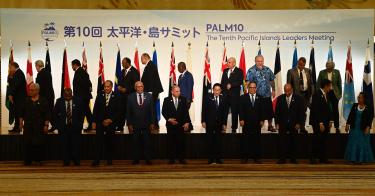During World War II, the Solomon Islands campaign was one of the most consequential of all the Pacific operations that produced an Allied victory. Nearly 80 years later, and after thousands of Americans lost their lives in that fight, the Southwest Pacific security environment is heating up once again. The United States, along with its regional allies and partners, face a new dilemma that has dramatically changed strategic thinking and the threat environment.
The primary trigger for America’s growing concern was the security agreement concluded between the Solomon Islands and China in April 2022. The secretive agreement, which was leaked, allows the Solomons to request the assistance of Chinese “police, armed forces, military personnel and other law enforcement and armed forces” to “[maintain] social order.” China is also authorized to undertake military activities “according to its own needs.” This includes the authority to “carry out logistical replenishment” and have Beijing’s ships dock and transit in the Solomon Islands.
The leaked language raises the possibility that China has permission to preposition military supplies and—more concerningly—to construct a military base in the Solomons. This could potentially result in the forward deployment of assets able to threaten U.S. and allied military installations and vessels in the region. While the Solomon Islands would need to consent to such requests, its government—including new Prime Minister Jeremiah Manele—is increasingly receptive to Chinese propositions, especially those which come with financial rewards.
For example, during then-Prime Minister Manasseh Sogavare’s visit to China in 2023, the two countries signed additional security agreements—including a police cooperation deal—and expressed joint support for China’s stance on various territorial claims, including over Taiwan. When the Solomon Islands recognized China over Taiwan in 2019, Manele was serving as foreign minister.
>>> Why the South China Sea Matters
In response, the Washington has significantly increased its engagement with Papua New Guinea (PNG), which lies to the west of the Solomons and was also the site of major fighting during WWII. In 2023, the United States and PNG signed a Defense Cooperation Agreement that allows for the free movement of U.S. aircraft, vehicles, and vessels within PNG’s territory and territorial waters.
The United States is also granted access to specific facilities and areas for exercises, aircraft usage, staging and deploying forces, prepositioning supplies, and other purposes that enhance regional responses to crisis scenarios. These facilities and areas include Lombrum Naval Base, Port Moresby Jacksons International Airport, and Nadzab Airport in Lae.
China has also shown interest in PNG, with PNG’s Foreign Minister Justin Tkachenko stating in January 2024 that his country was in the early stages of discussing a policing and security agreement with China. To date, however, no such agreement has been publicly announced.
The United States is not the only Pacific power that has changed its approach due to China’s advances. China’s actions in the region, including its focus on technological advances for long-range missile systems, have forced Australia to recalibrate its security posture in ways that align it even more closely with the United States.
The formation of AUKUS, a trilateral security partnership between Australia, the United Kingdom, and the United States, marked a significant shift in Australia’s strategic thinking. The partnership involves the purchase and construction of nuclear-powered, conventionally armed submarines, and a broad technology sharing and development agreement.
Australia plans to first purchase several Virginia-class submarines from the United States before domestically constructing a new nuclear submarine, known provisionally as SSN-AUKUS. All three countries are investing in their submarine industrial bases to expand production, maintenance, and repair capacity.
Canberra’s shift in strategic thinking is captured in its 2023 Defense Strategic Review. The review refocuses Australia’s attention from “low-level conflicts” to “potential threats arising from major power competition” and supports the development of new asymmetric warfare capabilities. China’s military advances serve as the primary motivator for this reassessment, as the document states that Australia believes the United States is no longer the “unipolar leader of the Indo-Pacific.”
Building off the Defense Strategic Review, Australia’s 2024 National Defense Strategy acknowledges the impact of U.S.-China strategic competition on the regional strategic balance of power and focuses the country’s defense spending on naval acquisition. The strategy also outlines avenues for enhanced engagement with Australian allies and partners in the Indo-Pacific.
New Zealand is also turning a corner. In August 2023, New Zealand released its first-ever National Security Strategy that acknowledges China’s assertiveness and the threats Beijing to its interests. Additionally, New Zealand’s 2023 Defense Policy and Strategy Statement views China as a threat to Australia’s and New Zealand’s influence in the Pacific. New Zealand is on track to expand its defense profile further, with officials interested in elevating its role in the Five Eyes intelligence network as well as its partnerships with AUKUS and NATO.
>>> It’s Not Too Late To Hold China Accountable on COVID
However, differences between the United States and New Zealand remain. New Zealand considers China to be an “essential” partner, meaning its criticism of China is not as explicit as that found in American or Australian documents. New Zealand’s trajectory, however, should be welcomed, as it rightly understands that China’s aggressive activities in the Southwest Pacific now pose direct challenges to its security.
Clearly, times have changed. The Southwest Pacific has not seen this much interest from great power competition since World War II. Washington should consider policy options that will better position United States to best compete against China in the Pacific.
That begins with the United States viewing the Southwest Pacific as a contested security environment in the broader Indo-Pacific theater. To secure competitive advantages against China, the United States should look to further bolster cooperation with Australia and New Zealand. Enhanced cooperation could include joint military exercises and exploring how New Zealand could participate in AUKUS Pillar II.
Pacific Islands leaders understand that U.S.-China competition has provided them with additional leverage when partnering with larger powers. Therefore, the United States and its allies cannot assume that Pacific Islands will automatically prefer them for security partnerships.
The New Cold War with China is taking shape in the Pacific Islands. If history tends to repeat itself, then, with the right security posture and cooperation with allies, the United States can once again ensure the Pacific Islands remain a vital part of the free and open Indo-Pacific.
This piece originally appeared in the Center for Maritime Strategy




